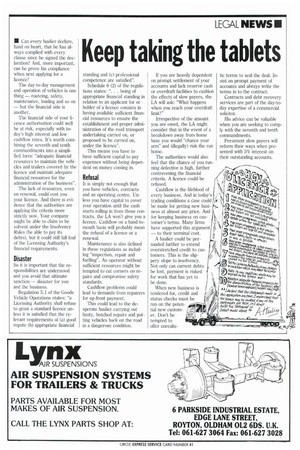Keep taking the tablets
Page 23

If you've noticed an error in this article please click here to report it so we can fix it.
11 Can every haulier declare, hand on heart, that he has always complied with every clause since he signed the declaration? And, more important, can he prove his compliance when next applying for a licence?
The day-to-day management and operation of vehicles is one thing — routcing, safety, maintenance, loading and so on — hut the financial side is another.
The financial side of your licence authorisation could well he at risk, especially with today's high interest and low cashflow rates. It's worth combining the seventh and tenth commandments into a simplified form: "adequate financial resources to maintain the vehicles and trailers covered by the licence and maintain adequate financial resources for the administration of the business".
The lack of resources, even on renewal, could cost you your licence. And there is evidence that the authorities are applying the criteria more strictly now. Your company might be able to claim to be solvent under the Insolvency Rules (be able to pay its debts), but it could still fall foul of the Licensing Authority's financial requirements.
Disaster
So it is important that the responsibilities are understood and you avoid that ultimate sanction — disaster for you and the business.
Regulation 5.1 of the Goods Vehicle Operations states: "a Licensing Authority shall refuse to grant a standard licence unless it is satisfied that the relevant requirements of (a) good repute (b) appropriate financial standing and (c) professional competence are satisfied''.
Schedule 6 (2) of the regulations states: ". . . being of appropriate financial standing in relation to an applicant for or holder of a licence consists in having available sufficient financial resources to ensure the establishment and proper administration of the road transport undertaking carried on, or proposed to be carried on, under the licence".
This means you have to have sufficient capital to pay expenses without being dependent on money coming in.
Refusal
It is simply not enough that you have vehicles, contracts and an operating centre. Unless you have capital to cover your operation until the cash starts rolling in from those contracts, the LA won't give you a licence. Cashflow on a hand-tomouth basis will probably mean the refusal of a licence or a renewal.
Maintenance is also defined in these regulations as including "inspection, repair and fuelling". An operator without sufficient resources might be tempted to cut corners on repairs and compromise safety standards.
Cashflow problems could lead to demands from repairers for up-front payment.
This could lead to the desperate haulier carrying out hasty, botched repairs and putting vehicles back on the road in a dangerous condition. If you are heavily dependent on prompt settlement of your accounts and lack reserve cash or overdraft facilities to cushion the effects of slow payers, the LA will ask: "What happens when you reach your overdraft limit?"
Irrespective of the amount you are owed, the LA might consider that in the event of a breakdown away from home base you would "chance your arm" and (illegally) risk the run home.
The authorities would also feel that the chance of you running defective is high, further contravening the financial criteria. A licence could be refused.
Cashflow is the lifeblood of every business. And in today's trading conditions a case could be made for getting new business at almost any price. And for keeping business on customer's terms. Many firms have supported this argument — to their terminal cost.
A haulier could be persuaded further to extend overstretched credit to customers. This is the slippery slope to insolvency. Not only can current debts be lost, payment is risked for work that has yet to be done.
When new business is tendered for, credit and status checks must be run on the potential new customer. Don't be tempted to offer unrealis tic terms to seal the deal. Insist on prompt payment of accounts and always write the terms in to the contract.
Contracts and debt recovery services are part of the day-today expertise of a commercial solicitor.
His advice can be valuable when you are seeking to comply with the seventh and tenth commandments.
Persistent slow payers will reform their ways when presented with 5% interest on their outstanding accounts.






















































































































































































